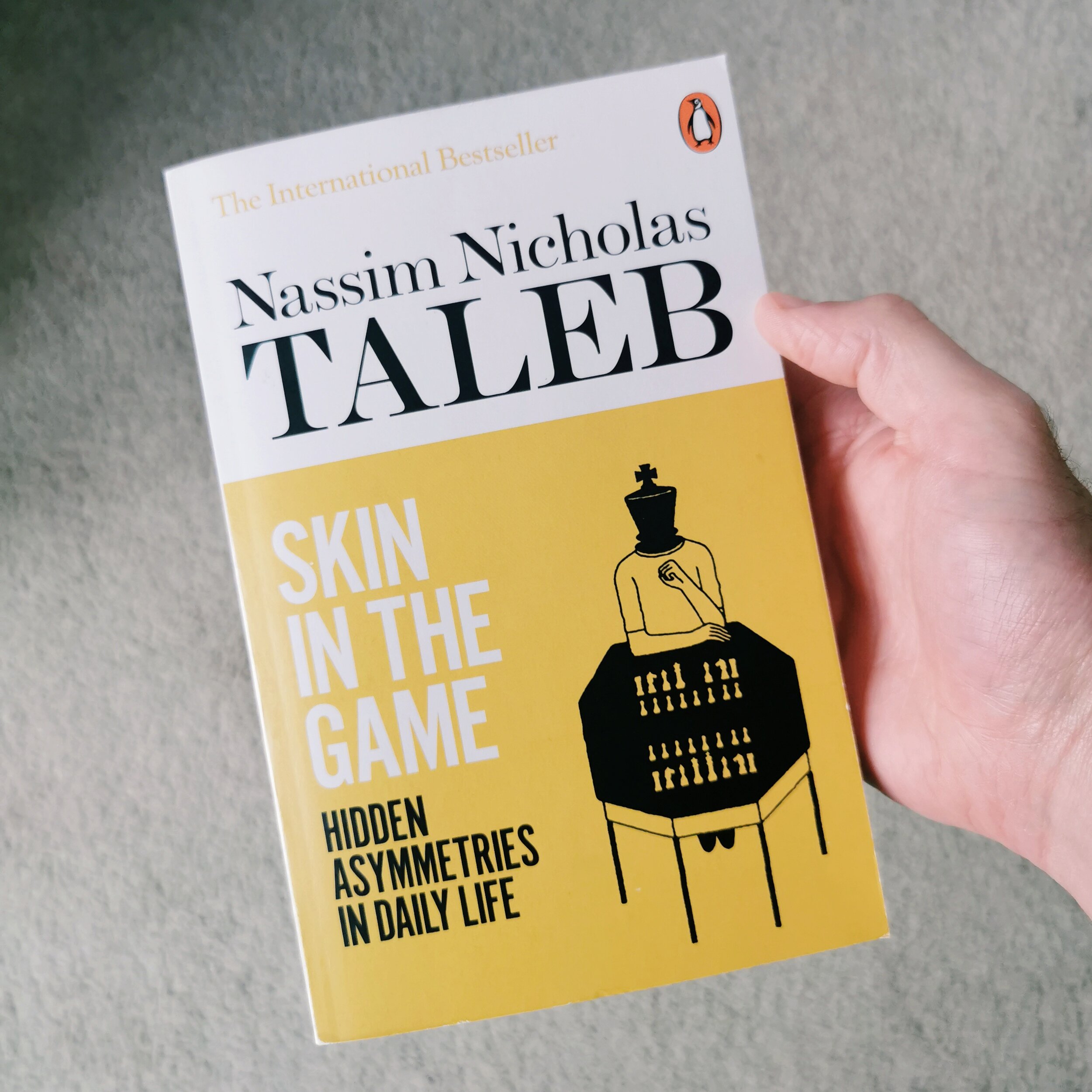Skin in the Game - Nassim Nicholas Taleb
3-Sentence Summary:
Having Skin in the Game (SITG) means being venerable to the consequences of your actions and what you say.
It is essential for good decision making (keeps overconfidence in check), learning (you get feedback in real-time), and giving/receiving advice (don’t give advice when you won’t feel the potential downside, and don’t take advice from someone who won’t feel the potential downside).
We should use this as a filtering mechanism for both making our own decisions (put skin in the game), and for assessing the actions of others (do they have skin in the game?).
Notes:
Having Skin in the Game (SITG) means being venerable to the consequences of your actions and what you say.
Having SITG is essential for good decision making (keeps overconfidence in check), learning ( you get feedback in real-time), and advising (don’t take advice from someone who won’t feel the potential downside).
“Treat others as you would like to be treated.” is 100s of years old (Golden rule). Better yet is the Silver Rule: “Don’t treat others as you would not like to be treated.” as it is easier to identify specific ways in which you would not like to be treated.
Without SITG, things get overly complicated (people are incentivised to sound smart as opposed to getting the job done), things get dull (no immediate feedback and therefore no short-term feeling of satisfaction or dopamine hits, which are needed to keep us going), and things miss out on being subjected to the corrective/evolutionary or eliminative process of time.
Employees have little SITG (trade freedom for security). Entrepreneurs have skin in the game. Even more than that, Artisans (people who won’t compromise their creative endeavours for money, no matter what) have Soul in the Game. If you can’t have soul in the game, you’re in the wrong game.
Ethics are more important than laws. Ethics are more likely to diverge to laws than the other way around. We have our own SITG with ethics, as opposed to giving agency to the government.
We can have collective SITG within a sufficiently small group (e.g. Family = I have your back. Your wins/losses are also mine). These groups can have collective SITG with other groups (town, country, etc.) but individuals can’t have collective SITG if the group is too big (the whole world). For that reason, we should expect poorer decisions when making choices that affect too big of a group. Decisions should be made at a more local level where possible.
In complex systems, groups act differently than you would expect based on the behaviour of individuals. The interactions are more important than the individual act, and are more predictable.
E.g. “The Minority Rule”. It only takes a small number of sufficiently adamant individuals for the group to have to change its behaviour, especially if the cost to the group is small. By looking at the individuals in the group, you’d probably say that isn’t the opinion of most of the individuals. Yet, the change occurs.
E.g. Most food in the USA is Koscher, in spite of only a small number of people wanting that, because the fact that it’s Koscher means very little negative to most people, but a lot of positive to an adamant few.
Systems can work well even with unintelligent individuals.
Action without talk is better than talk without action.
An I.Y.I. - Intellectual Yet Idiot - has a merely theoretical view of the world, thinking they know what is best for everyone, and that everyone who disagrees is simply uneducated. They have little hands-on experience or skin in the game. They think they know more than they do.
We generally don’t mind people who are rich and famous, as long as they took risk (had SITG) to get there, and did so on merit. It’s those who seemed to get there by luck that we don’t like. If we allow markets to operate freely, these people will be taken down over time and replaced.
Lindy effect: If something has lasted 50 years, it’s likely to last 50 more (excluding perishables like food and individual human beings). Ideas, books, laws, theories, technologies etc will have SITG and time will be their judge, and those that survive should be seen as robust.
All else equal, those who don’t have the usual characteristics for a given role, but got to the same level as those who do, are likely to be better, since they had to get there in spite of being different.
If it looks like “science” (or art, business (business plans), literature (fancy words) etc) it is probably not a good version of it. It is taking no risks and doesn’t have SITG.
Threats should have SITG. Verbal threats are weak.
Focus on the end consumer, not your fellow professionals, or your feedback mechanism will be in the wrong place (skin in the wrong game).
If your private life doesn’t back up what you say, what you say gets cancelled out, not your private life.
Virtue is doing something for the collective without needing credit, or better yet, if it is virtuous and unpopular, because your reputation is on the line.
Your beliefs are not what you say you believe. They’re what you act out and are willing to put SITG for.
Religions/beliefs are Lindy-effect-proof, and have likely lasted because they’re useful for survival, even if we can’t say exactly why.
Ultimately, rationality is defined by that which is good for survival.
If complete ruin is a viable option, cost-benefit analyses are far less useful, and the rational thing is to avoid ruin. I.e. Don’t play Russian Roulette.
If you enjoyed this summary, you’ll probably enjoy the full book. Get it here: LINK TO BOOK (AMAZON)
Or get it for free on audiobook when you sign up for an Audible account: LINK TO AUDIOBOOK (AMAZON)
(This website uses amazon referral links as part of the Amazon Associates program.)
